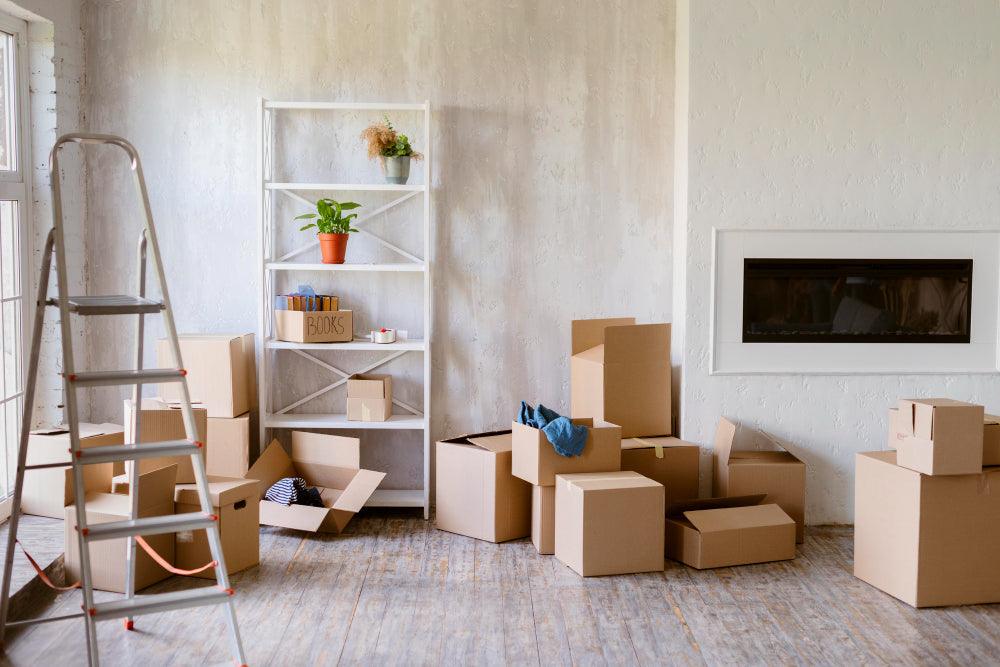Storage space is a constant problem for digital nomads. At least it used to be. Extra storage is necessary for those on the road and living a remote lifestyle. Whether traveling across the US or living in a van with limited space, you'll need to store your belongings for extended periods. Unfortunately, most people only realize the importance of storage once they're about ready to set on their journey and then are hit with the sudden problem of figuring out where to put all of their stuff while they're gone.
This detailed guide will first go over some initial storage considerations you should keep in mind before your trip. We will also analyze the importance of preparation and the most effective storage solutions for digital nomads. This includes flexible storage models like Juujbox on one end to renting an apartment or storage unit on the other.
By the end of this guide, you should have the information you need to choose the best self-storage model or at least have a game plan on where to store your things while you travel.
Self Storage for Digital Nomads: Initial Storing Considerations
If you are a digital nomad, you have probably thought about how you store your belongings during your travels. If not, there are a few things you should consider. For this guide, we will assume that you still need a place to store your belongings and that you are looking for the best way to store your personal belongings while you travel.

In most cases, deciding on the best storage solution will depend on your personal needs and preferences. So here are a few questions to ask yourself:
- Is storing the best way to go? If so, this might be the best time to eliminate certain things you don’t need. Maybe you’d like to sell some of your belongings and replace them once you’re back. Storage costs can add up over a long period, so if you're going to be gone for a while, it might make sense to sell or get rid of any large items like furniture that will take up a lot of space and require you to opt for a bigger storage option. Bigger storage requirements mean more money.
- How many items would you like to store? The solutions we will explore in this article have specific pros and cons. For example, if you want to store a few (yet valuable) items, Juujbox is simply the best way to go. On the flip side, as mentioned above, if you have many larger items, you'll most likely have to opt for a self-storage unit.
- How long do you plan to travel? Travel duration is also an important consideration. Most digital nomads need storage for months, if not years. If that’s the case, you should consider a unique, flexible long-term storage plan for your items.
- Do you have any special items you’d like to store? For example, vintage items, electronics, and art pieces require climate-controlled storage to be safe. Keep in mind that not all storage facilities offer optimal storage conditions. This is why storing items in more than one facility is bright for digital nomads.
- Do you need accessibility and flexibility while you're traveling? A storage provider like Juujbox can provide special accommodations like shipping specific storage bins to a different location or offering pick-up and delivery services. Take these options into consideration if this is something you can take advantage of.
Preparation is Key for Digital Nomads: Storing Before you Travel.
Once you have answered all these questions, you are one step closer to deciding on the best storage solution. The truth is preparation is super essential for you as a digital nomad. Finding a solution for storing your stuff is just one piece of the puzzle. Digital nomads spend a lot of time planning their itinerary and working through details like WiFi speeds in addition to the location and cost of where they'll spend their time at their destination.
But since storage is the critical element of this guide, let us find out why preparation is vital.
How Important is Storage for Digital Nomads?
Storing your items is not only the safest solution but also the most cost-effective. In many cases, digital nomads who own an apartment rent it during their absence via platforms like Airbnb. Fortunately, Juujbox also provides self-storage for Airbnb hosts so you can keep your personal belongings secure while you travel.
On the other hand, if you rent a condo or lease an apartment, you'll have to pay rent to leave your belongings in your house. Usually, moving out and ending a lease is the first thing digital nomads do as part of their journey. And since being a digital nomad requires a minimalist lifestyle, finding top-notch storage space is significant.
Let us look at the five storage solutions we could find for you as a digital nomad.
5 Storage Solutions for Digital Nomads
1. Self-Storage Option: Juujbox
Juujbox Storage for Digital Nomads is the most flexible self-storage system in the US. It is a particularly effective solution for digital nomads for several reasons. First of all, prices are very affordable and based on the number of storage bins you want to store. Our plans start from as low as $14.95 per month.

But the best part about Juujbox is that we pick up and deliver items right to the door you're staying at. This is the reason why many digital nomads use this storage solution. The process is straightforward. All you need to do is pack your items in the storage bins we'll provide (or use your boxes and bins) and call the company to schedule a pickup. Then, Juujbox will store your personal belongings in a secure and climate-controlled warehouse until you need everything back.
When you are back from your trip, all you have to do is call and ask for a delivery. This straightforward storage plan is why Juujbox is at the top of any list for those living the remote life.
2. Self-Storage Option: Storage Units
As mentioned above, Juujbox is the most flexible self-storage option for digital nomads based in the US. But, if you want to store multiple large items like furniture, you’ll probably need a storage unit for your belongings.
The truth is that there are multiple self-storage facilities for you around the US. Our experience says that CubeSmart and A1 self-storage offer the best and most affordable storage units for digital nomads in San Diego and other cities.
Of course, both pricing plans are more expensive than Juujbox. Yet, this is an excellent approach if you have large items you don’t want to sell.
3. Storing your Belongings with Family or Friends
This solution is self-explanatory. If you want to spend less on renting a storage unit, you can ask your family or friends to store your things while traveling. Although this is the only way to store your stuff for free in most cases, it also has some disadvantages.
First of all, you have to ask for a favor. This can be difficult, especially if your friends and relatives are already tight on space. At the same time, as a digital nomad, you will be out of town for an extended period. This makes the requests a sometimes uncomfortable conversation.
Secondly, if your family or friend has a significant life event like a move, you must find a way to get your items moved from one place to another. Unfortunately, that can mean spending long hours on the phone getting a hold of movers and asking for special accommodations that most companies want to avoid providing.
And finally, while leaving your stuff with family or friends is safe, you are not covered if it gets damaged. For all these reasons, this solution is rarely preferred by digital nomads. But it can be a short-term emergency solution that you can keep in mind.
4. Sublet a Flat
Subletting an apartment is an option that used to be popular. Some digital nomads preferred to rent an apartment under their name and rent it to someone during their travels. This would allow you to store your belongings without renting a storage unit.
But times have changed, and most landlords don't allow the subletting of their apartments as part of the lease agreement. It brings too much liability and hassle when the original lessee cannot handle any issues. This is even more rare in popular cities like San Diego, where most homeowners use professional property management companies to manage their properties and don't self-manage the properties themselves.
Even if you were to find a property for subletting, real estate is so valuable that designating an area to store your things while another tenant lives in your home is a tough pill to swallow. So basically, subletting a property and storing your items isn't an option.
5. Rent or Buy a Cheap Property
Instead of renting a storage unit, some digital nomads buy or rent a property. For example, some commercial or residential properties may be offered at a low price. The same is true for containers. This is an innovative financial solution if you plan to travel for a very long period (at least a few years), as buying/ renting a property can be cheaper than self-storage in the long run.
Of course, if you decide to buy a property to store your items, you will have to make an upfront payment. At the same time, you will probably have to take care of the expenses and maintenance of your property while traveling.
Finally, this solution goes against the nomadic lifestyle. To be precise, when you buy/rent a property, you limit your ability to get up and leave, defeating the whole point of living a remote lifestyle.
Wrap Up
It becomes clear that choosing the best storage method is a challenging task for digital nomads. Still, it always depends on your needs.
Juujbox has a tailored self-storage solution specific for digital nomads, giving it a unique advantage over a traditional self-storage provider.
On the other hand, subletting or renting a property can be an innovative solution if you need help finding an affordable self-storage facility in your area. Finally, family and friends can be helpful for valuable items and emergencies.



